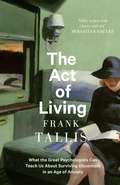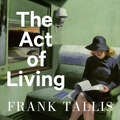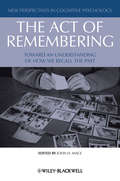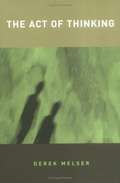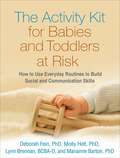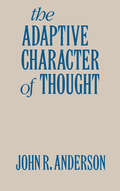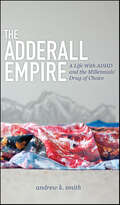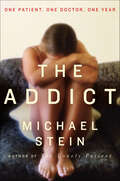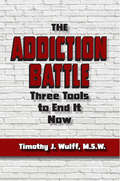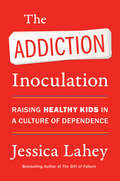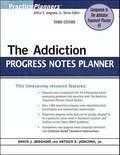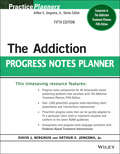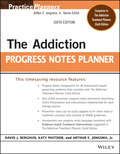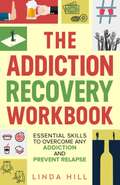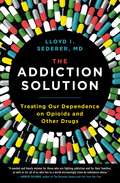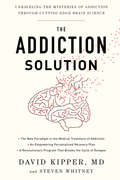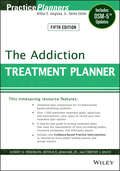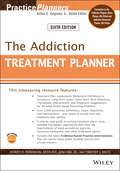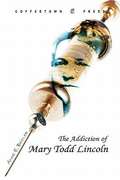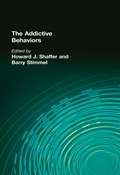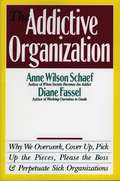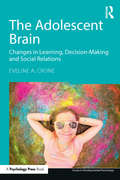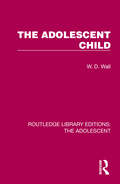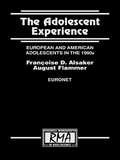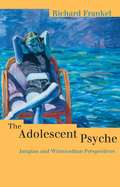- Table View
- List View
The Act of Living: What the Great Psychologists Can Teach Us About Surviving Discontent in an Age of Anxiety
by Frank Tallis'Tallis writes with clarity and wit' Sebastian FaulksScience, technology and western liberal democracy have all had a dramatic impact on our quality of life. Compared to previous generations, we have unprecedented access to information, increased personal freedom, more material comforts and more possessions. Yet, even before the shock of Covid-19, more people than ever before were reporting being depressed, anxious or unfulfilled. As our material circumstances become easier, life seems to get harder. Why should this be? Shelves sag under the weight of self-help manuals and the internet is awash with the advice of role-models and celebrity gurus; however, to what extent can these sources be expected to supply meaningful, practical answers - the kind of answers relevant to sceptical individuals living in a modern, technologically advanced culture? For over a hundred years, psychotherapists have been developing and refining models of the human mind. They have endeavoured to alleviate distress and they have offered help to people who want to make better life choices. Although the clinical provenance of psychotherapy is important, the legacy of psychotherapy has much wider relevance. It can offer original perspectives on the big questions usually entrusted to philosophers and representative of faith: Who am I? Why am I here? How should I live?In this compelling and important book, the principle contributions of the outstanding figures associated with the practice of psychotherapy are explained: from Freud to Ellis, Jung to Laing, Adler to Hayes. Viewed as a single, cohesive intellectual tradition, Frank Tallis argues that psychotherapeutic thinking is an immensely valuable and under exploited resource.
The Act of Living: What the Great Psychologists Can Teach Us About Surviving Discontent in an Age of Anxiety
by Frank Tallis'Tallis writes with clarity and wit' Sebastian FaulksScience, technology and western liberal democracy have all had a dramatic impact on our quality of life. Compared to previous generations, we have unprecedented access to information, increased personal freedom, more material comforts and more possessions. Yet, even before the shock of Covid-19, more people than ever before were reporting being depressed, anxious or unfulfilled. As our material circumstances become easier, life seems to get harder. Why should this be? Shelves sag under the weight of self-help manuals and the internet is awash with the advice of role-models and celebrity gurus; however, to what extent can these sources be expected to supply meaningful, practical answers - the kind of answers relevant to sceptical individuals living in a modern, technologically advanced culture? For over a hundred years, psychotherapists have been developing and refining models of the human mind. They have endeavoured to alleviate distress and they have offered help to people who want to make better life choices. Although the clinical provenance of psychotherapy is important, the legacy of psychotherapy has much wider relevance. It can offer original perspectives on the big questions usually entrusted to philosophers and representative of faith: Who am I? Why am I here? How should I live?In this compelling and important book, the principle contributions of the outstanding figures associated with the practice of psychotherapy are explained: from Freud to Ellis, Jung to Laing, Adler to Hayes. Viewed as a single, cohesive intellectual tradition, Frank Tallis argues that psychotherapeutic thinking is an immensely valuable and under exploited resource.
The Act of Remembering: Toward an Understanding of How We Recall the Past (New Perspectives in Cognitive Psychology #3)
by John H. MaceThe first volume devoted solely to autobiographical memory retrieval, The Act of Remembering serves as a primer of ideas, methodology, and central topics, and lays the groundwork for future research in the field. Contains new, forward-looking theories from leading international scholars Answers questions such as: Do we retrieve memories according to when and where we need them? How much conscious control do we have over what we remember? Why are some people more likely than others to have intrusive ‘flashbacks’ following a stressful event? Pays particular attention to voluntary and involuntary recall
The Act of Thinking
by Derek MelserMelser argues that the core assumption of both folk psychology and cognitive science that thinking goes on in the head is mistaken. He argues that thinking is not an intracranial process of any kind, mental or neural, but is rather a learned action of the person.
The Activity Kit for Babies and Toddlers at Risk
by Molly Helt Deborah Fein Lynn Brennan Marianne BartonSuspecting that your baby or toddler may have autism spectrum disorder or another developmental delay can be scary and overwhelming. But there is a lot you can do to help, even while waiting for an evaluation or early intervention. With the right tools, everyday tasks can be terrific opportunities for building critical social and communication skills. Start at the kitchen table, bathtub, or shopping cart! In this easy-to-navigate guide, leading experts present more than 100 games and activities designed to support development in children from birth to age 3. Your child's daily routines are transformed into learning opportunities that promote crucial abilities, like how to imitate others or use simple hand gestures to convey wants and needs. As a parent, you are the most important person in your child's life. Now you can be the best teacher, too.
The Adaptive Character of Thought (Studies in Cognition)
by John R. AndersonThis important volume examines the phenomena of cognition from an adaptive perspective. Rather than adhering to the typical practice in cognitive psychology of trying to predict behavior from a model of cognitive mechanisms, this book develops a number of models that successfully predict behavior from the structure of the environment to which cognition is adapted. The methodology -- called rational analysis -- involves specifying the information-processing goals of the system, the structure of the environment, and the computational constraints on the system, allowing predictions about behavior to be made by determining what behavior would be optimal under these assumptions. The Adaptive Character of Thought applies this methodology in great detail to four cognitive phenomena: memory, categorization, causal inference, and problem solving.
The Adderall Empire: A Life With ADHD and the Millennials' Drug of Choice
by Andrew K. SmithIs there life after Adderall?Andrew K. Smith’s hooligan pranks and social impulsiveness paints a picture of Attention Deficit Hyperactivity Disorder (ADHD) before medication, and it would seem that the little orange pills could cure his mischief. But readers will furrow their brows as they enter The Adderall Empire, traveling with the author through the chemically conflicting mind states. Is working-memory training a feasible alternative? Readers will beg for the answer, hoping Andrew stops getting into trouble before his parents disown him or he winds up in jail. Again.Everyone is curious about Adderall. Young people abuse it, adults are addicted to it, teachers wish their students would take it, and parents consider prescriptions for their children. The Adderall Empire gives honest evidence of how working-memory training can change the life of a person with ADHD and provides readers with information about an alternative to ADHD prescriptions.Find out what it’s like to exit the Empire!
The Addict: One Patient, One Doctor, One Year
by Michael Stein“A gripping, illuminating book . . . Dr. Stein is drawn, in an almost Sherlock Holmesian way, toward trying to fathom and analyze addicts’ behavior. . . . hauntingly and successfully, Stein lets readers make a doctor’s experiences their own.” — New York Times“Beautifully told… [with] great insight, empathy and compassion.” — Abraham Verghese, author of The Tennis Partner, My Own Country, and Cutting for StoneThe Addict is the powerful and revealing narrative of Dr. Michael Stein’s year-long treatment of a young woman addicted to Vicodin. Dr. Stein has followed up his award winning book The Lonely Patient with “a useful, sensible, and often inspiring guide to how the medical profession does—and should—treat the sick, and the sick at heart.” (Francine Prose, O magazine)
The Addiction Battle: Three Tools to End It Now
by Timothy J Wulff Timothy J. Wulff, M.S.W.Is every day a challenge as you wage your personal battle against addiction? If you've fallen into the addiction trap, you are not alone. It is estimated that one out of ten Americans is struggling with addiction. Author Timothy Wulff, M.S.W., is an addiction therapist who has spent more than a decade successfully treating individuals addicted to drugs and alcohol. To identify the source of addiction, Wulff focuses on beliefs about one's self that develop early in life and that eventually obscure the strong and positive true self, increasing susceptibility to addiction. In The Addiction Battle, Wulff will help you discover where your greatest strengths are buried and teach you how to use their hidden power to overcome addiction. Wulff will teach you how to redefine the terms anger, selfishness, and troublemaking, and make them key tools in shaping your actions from a new healthy perspective:•• Anger—It's a powerful emotion that can be used constructively to protect yourself.•• Selfishness—Healthy selfishness is good self-care. Without it, addiction continues.•• Troublemaking—the opposite of pleasing others, troublemaking helps you stand up for your own feelings, needs, and desires.Learning to use these tools, which are already part of you, will enable you to reclaim these inner strengths. Through the book's practical and sensitive pages, Wulff gives you a way to begin your life anew and triumph over addiction.
The Addiction Inoculation: Raising Healthy Kids in a Culture of Dependence
by Jessica Lahey“The Addiction Inoculation is a vital look into best practices parenting. Writing as a teacher, a mother, and, as it happens, a recovering alcoholic, Lahey's stance is so compassionate, her advice so smart, any and all parents will benefit from her hard-won wisdom.” —Peggy Orenstein, author of Girls & Sex and Boys & SexIn this supportive, life-saving resource, the New York Times bestselling author of The Gift of Failure helps parents and educators understand the roots of substance abuse and identify who is most at risk for addiction, and offers practical steps for prevention.Jessica Lahey was born into a family with a long history of alcoholism and drug abuse. Despite her desire to thwart her genetic legacy, she became an alcoholic and didn’t find her way out until her early forties. Jessica has worked as a teacher in substance abuse programs for teens, and was determined to inoculate her two adolescent sons against their most dangerous inheritance. All children, regardless of their genetics, are at some risk for substance abuse. According to the National Center on Addiction and Substance Abuse, teen drug addiction is the nation’s largest preventable and costly health problem. Despite the existence of proven preventive strategies, nine out of ten adults with substance use disorder report they began drinking and taking drugs before age eighteen. The Addiction Inoculation is a comprehensive resource parents and educators can use to prevent substance abuse in children. Based on research in child welfare, psychology, substance abuse, and developmental neuroscience, this essential guide provides evidence-based strategies and practical tools adults need to understand, support, and educate resilient, addiction-resistant children. The guidelines are age-appropriate and actionable—from navigating a child’s risk for addiction, to interpreting signs of early abuse, to advice for broaching difficult conversations with children. The Addiction Inoculation is an empathetic, accessible resource for anyone who plays a vital role in children’s lives—parents, teachers, coaches, or pediatricians—to help them raise kids who will grow up healthy, happy, and addiction-free.
The Addiction Progress Notes Planner
by Arthur E. Jongsma Jr. David J. BerghuisPracticePlanners: The Bestselling treatment planning system for mental health professionalsThe Addiction Progress Notes Planner, Third Edition contains complete prewritten session and patient presentation descriptions for each behavioral problem in The Addiction Treatment Planner, Fourth Edition. The prewritten progress notes can be easily and quickly adapted to fit a particular client need or treatment situation.Saves you hours of time-consuming paperwork, yet offers the freedom to develop customized progress notesOrganized around 44 behaviorally based presenting problems, including depression,gambling, nicotine abuse/dependence, anxiety, and eating disordersFeatures over 1,000 prewritten progress notes (summarizing patient presentation, themes of session, and treatment delivered)Provides an array of treatment approaches that correspond with the behavioral problems and DSM-IV-TRTM diagnostic categories in The Addiction Treatment Planner, Fourth EditionOffers sample progress notes that conform to the requirements of most third-party payors and accrediting agencies, including CARF, The Joint Commission (TJC), COA, and the NCQAPresents new and updated information on the role of evidence-based practice in progress notes writing and the special status of progress notes under HIPAA
The Addiction Progress Notes Planner (PracticePlanners #199)
by Arthur E. Jongsma Jr. David J. BerghuisSave hours of time-consuming paperwork The Addiction Progress Notes Planner, Fifth Edition provides prewritten session and patient presentation descriptions for each behavioral problem in the Addiction Treatment Planner, Fifth Edition. The prewritten progress notes can be easily and quickly adapted to fit a particular client need or treatment situation. Saves you hours of time-consuming paperwork, yet offers the freedom to develop customized progress notes Organized around 44 behaviorally based presenting problems including depression, gambling, nicotine abuse/dependence, chronic pain, and eating disorders Features over 1,000 prewritten progress notes summarizing patient presentation, themes of session, and treatment delivered Provides an array of treatment approaches that correspond with the behavioral problems and DSM-5 diagnostic categories in The Addiction Treatment Planner, Fifth Edition Offers sample progress notes that conform to the latest ASAM guidelines and meet the requirements of most third-party payors and accrediting agencies, including CARF, TJC, COA, and the NCQA Incorporates new progress notes language consistent with Evidence-Based Treatment Interventions
The Addiction Progress Notes Planner (PracticePlanners)
by Arthur E. Jongsma Jr.An invaluable practice resource for practitioners engaged in addictions treatment In The Addiction Progress Notes Planner, Sixth Edition, a team of distinguished mental health professionals delivers complete, pre-written session and patient presentation descriptions for every behavioral problem in the Addictions Treatment Planner, Sixth Edition. Each note can be simply and quickly adapted to fit a real-world client need or treatment situation while remaining completely unified with the client’s treatment plan. This new edition offers new and revised evidence-based objectives and interventions organized around 46 behavior-based presentations, including alcoholism, nicotine dependence, substance abuse, problem gambling, eating disorders, and sexual addictions. The resource also offers: A wide array of treatment approaches that correspond to the behavioral problems and DSM-V diagnostic categories included in the Addiction Treatment Planner, Sixth Edition Sample progress notes conforming to the requirements of most third-party payors and accrediting agencies, including CARF, TJC, COA, and the NCQA Brand-new chapters on Opioid Use Disorder, Panic/Agoraphobia, and Vocational StressThe Addiction Progress Notes Planner is an indispensable practice aid for addictions counselors, mental health counselors, social workers, psychologists, psychiatrists, and anyone else treating clients suffering from addictions.
The Addiction Recovery Workbook: Essential Skills to Overcome Any Addiction and Prevent Relapse
by Linda HillAddiction recovery requires a rewiring of your mind and a strong commitment to change. This can be a challenging process, but with the right guidance, a life free from the suffocating grip of addiction is within reach. <P><p> The Addiction Recovery Workbook provides the structured and proven frameworks that you need to follow to achieve lasting results. This guide: <p>• Explains the science behind addiction, how it affects the brain, and how to overcome it. <p>• Outlines common symptoms of addiction so you can become aware of them before they worsen. <p>• Identifies risk factors for addiction so you don’t self-sabotage your recovery. <p>• Provides in-depth information on Cognitive Behavioral Therapy (CBT) and its various techniques that have helped countless people end their addictions. <p>• Guides readers through the principles of <p>• Acceptance and Commitment Therapy (ACT) and how to use mindfulness, cognitive diffusion, and value clarification. <p>• Explains Exposure and Response Prevention Therapy (ERP) that will help you manage even the most powerful cravings. <p>• Covers the causes of relapse and how to prevent it, including tips for avoiding triggers and maintaining a healthy lifestyle. <p>• Explains how to build your support networks during recovery, including practical advice for building and maintaining positive relationships. <p>• Offers case studies and real-world examples to illustrate the concepts and techniques covered in the book. <P><p> This comprehensive guide offers practical, evidence-based techniques and exercises that will help you gain insight into your addiction and develop the skills you need to overcome it. <P><p> Explore all aspects of addiction recovery, including self-awareness, stress management, mindfulness, communication skills, and more. With interactive activities and journal prompts, readers will deepen their understanding of addiction and develop the skills needed for recovery. <P><p> Whether you're seeking to overcome addiction yourself or seeking to help a loved one, The Addiction Recovery Workbook is an essential tool for anyone looking to take back control of their life.
The Addiction Solution: Treating Our Dependence on Opioids and Other Drugs
by Lloyd SedererA groundbreaking examination of addiction from a psychiatrist and public health doctor, offering practical, proven solutions for individuals, families, and communities dealing with substance use and abuse.Written with warmth, accessibility, and vast authority, The Addiction Solution is a practical guide through the world of drug use and abuse and addiction treatment. Here, Lloyd I. Sederer, MD, brings together scientific and clinical knowledge, policy suggestions, and case studies to describe our current drug crisis and establish a clear path forward to recovery and health. In a time when so many people are affected by the addiction epidemic, when 142 people die of overdoses every day in the United States, principally from opioids, Sederer’s decades of wisdom and clinical experience are needed more than ever before. With a timely focus on opioids, Sederer takes us through the proven essentials of addiction treatment and explains why so many of our current policies, like the lingering remnants of the War on Drugs, fail to help drug users, their families, and their wider communities. He identifies a key insight, often overlooked in popular and professional writing about addiction and its treatment: namely, that people who use drugs do so to meet specific needs, and that drugs may be the best solution those people currently have. Writing with generosity and empathy about the many Americans who use illicit and prescribed substances, Sederer lays out specific, evidence-based, researched solutions to the prevention and problems of drug use, including exercise, medications, therapy, recovery programs, and community services. In this challenging time, The Addiction Solution provides practical help, comfort, and hope.
The Addiction Solution: Unraveling the Mysteries of Addiction through Cutting-Edge Brain Science
by David Kipper Steven WhitneyA revolutionary and empowering paradigm in treating addiction based on groundbreaking new science.For decades addiction has been viewed and treated as a social and behavioral illness, afflicting people of "weak" character and "bad" moral fiber. However, recent breakthroughs in genetic technology have enabled doctors, for the first time, to correctly diagnose the disease and prove that addiction is an inherited, neuro-chemical disease originating in brain chemistry, determined by genetics, and triggered by stress.In their groundbreaking The Addiction Solution, David Kipper, MD, and Steven Whitney distill these exciting findings into a guide for the millions of adults who want to be free from the cycle of addiction, and for their loved ones who want to better understand it and to help. It draws on composite case histories to illustrate how the innovative Personal Recovery Program works by customizing treatment for a diverse group of addicts abusing a wide variety of different substances—from the first day of treatment to its successful resolution. The result is a complete guide to a world made brand-new by this enormous paradigm shift in the treatment of addiction.
The Addiction Treatment Planner
by Timothy J. Bruce Arthur E. Jongsma Jr. Robert R. PerkinsonThe bestselling treatment planning system for mental health professionalsThe Addiction Treatment Planner, Fifth Edition provides all the elements necessary to quickly and easily develop formal treatment plans that satisfy the demands of HMOs, managed care companies, third-party payors, and state and federal agencies.New edition features empirically supported, evidence-based treatment interventionsOrganized around 43 behaviorally based presenting problems, including substance use, eating disorders, schizoid traits, and othersOver 1,000 prewritten treatment goals, objectives, and interventions--plus space to record your own treatment plan optionsEasy-to-use reference format helps locate treatment plan components by behavioral problemIncludes a sample treatment plan that conforms to the requirements of most third-party payors and accrediting agencies including CARF, The Joint Commission (TJC), COA, and the NCQA
The Addiction Treatment Planner: Includes Dsm-5 Updates (PracticePlanners #192)
by Arthur E. Jongsma Jr.Clarify, simplify, and accelerate the treatment planning process so you can spend more time with clientsThe Addiction Treatment Planner, Sixth Edition: provides all the elements necessary to quickly and easily develop formal treatment plans that satisfy the demands of HMOs, managed care companies, third-party payers, and state and federal agencies. This valuable resource contains treatment plan components for 48 behaviorally based presenting problems including depression, intimate relationship conflicts, chronic pain, anxiety, substance use, borderline personality, and more. You'll save hours by speeding up the completion of time-consuming paperwork, without sacrificing your freedom to develop customized treatment plans for clients. This updated edition includes new and revised evidence-based objectives and interventions, new online resources, expanded references, an expanded list of client workbooks and self-help titles, and the latest information on assessment instruments. In addition, you'll find new chapters on some of today's most challenging issues- Opiod Use Disorder, Panic/Agoraphobia, Loneliness, and Vocational Stress. New suggested homework exercises will help you encourage your clients to bridge their therapeutic work to home. Quickly and easily develop treatment plans that satisfy third-party requirements. Access extensive references for treatment techniques, client workbooks and more. Offer effective and evidence-based homework exercises to clients with any of 48 behaviorally based presenting problems. Enjoy time-saving treatment goals, objectives and interventions- pluse space to record your own customized treatment plan. This book's easy-to-use reference format helps locate treatment plan components by presenting behavioral problem or DSM-5 diagnosis. Inside, you'll also find a sample treatment plan that conforms to the requirements of most third-party payors and accrediting agencies including CARF, The Joint Commission (TJC), COA, and the NCQA. The Additction Treatment Planner, Sixth Edition: will liberate you to focus on what's really important in your clinical work.
The Addiction of Mary Todd Lincoln
by Anne E. BeidlerMary Todd Lincoln, wife of the president we have immortalized, has always been difficult for us to understand. She could appear poised and brilliant one moment yet rude and ugly the next. Sometimes competent and strong, able to entertain dignitaries from around the world, at other times she appeared dependent and weak. At times she seemed utterly beside herself with sobbing and screaming. Historians have mostly avoided saying very much about Mary Todd Lincoln except in reference to her husband, Abraham. To many it would seem that Mary Todd Lincoln is still an embarrassment in the tragic story of her martyred husband. But Mary Todd Lincoln lived her own tragic story even before Abraham was murdered. She was an addict, addicted to the opiates she needed for her migraine headaches. Seeing Mary Todd Lincoln as an addict helps us understand her and give her the compassion and admiration she deserves. In her time there had been no courageous First Lady like Betty Ford to help people understand the power of addiction. There was no treatment center. In Mary Todd Lincoln's time there were many addicts at all levels of society, as there are now, but it was a more socially acceptable condition for men to have than for women. More importantly, addiction was not very well understood, and it was often mistreated. Because Mary Todd Lincoln's only surviving son, Robert Lincoln, made a great effort to protect his mother and his family from journalists and historians, he intentionally destroyed most of Mary Todd Lincoln's medical records and many of her letters. What he could not destroy, however, is the record of Mary Todd Lincoln's pain and the record of how she behaved while living with this pain. In The Addiction of Mary Todd Lincoln, we can see clearly, for the first time, what Mary Todd Lincoln had to live with and the courage it took for her to carry on.
The Addictive Behaviors
by Barry Stimmel Howard J ShafferThoroughly examines the natural history and social etiology of addictive behaviors.
The Addictive Organization
by Anne Wilson SchaefSchaef and Fassel show how managers, workers, and organization members exhibit the classic symptoms of addiction: denying and avoiding problems, assuming that there is no other way of acting, and manipulating events to maintain the status quo.
The Adolescent Brain: Changes in learning, decision-making and social relations (Essays in Developmental Psychology)
by Eveline A. CroneIn recent years there have been tremendous advances in understanding how brain development underlies behavioural changes in adolescence. Based on the latest discoveries in the research field, Eveline A. Crone examines changes in learning, emotions, face processing and social relationships in relation to brain maturation, across the fascinating period of adolescent development. This book covers new insights from brain research that help us to understand what happens when children turn into adolescents and then into young adults. Why do they show increases in sensation-seeking, risk-taking and sensitivity to opinions of friends? With the arrival of neuroimaging techniques, it is now possible to unravel what goes on in an individual’s brain when completing cognitive tasks, when playing computer games, or when engaging in online social interactions. These findings help reveal how children learn, control thoughts and actions, plan activities, control emotions and think about intentions of others, offering a new perspective on behaviour and motivations of adolescents. This is the first comprehensive book to cover the many domains of adolescent brain development, stretching from cognitive to affective to social development. It is valuable reading for students and researchers in the field of adolescent development and developmental cognitive neuroscience and those interested in how the developing brain affects behaviour in the teenage years.
The Adolescent Child (Routledge Library Editions: The Adolescent)
by W. D. WallOriginally published in 1948, The Adolescent Child provided vital information on adolescence for parents, teachers, club leaders, social and religious workers and welfare supervisors in factories at the time. With research from both the UK and the US the author looks at the psychology of the adolescent through the many stages they encounter, from physical and emotional changes; self-identity; love and friendship to education and work. Today it can be read and enjoyed in its historical context.
The Adolescent Experience: European and American Adolescents in the 1990s (Research Monographs in Adolescence Series)
by August Flammer Francoise D. AlsakerThe opening of the borders to Eastern Europe has expanded our view on European diversities and offered new opportunities to examine the effects of the heterogeneity in European cultural backgrounds and political systems on personality and social development. This book is a first step in utilizing the rich cultural resource offered by the large number of cultural units represented in Europe and--at least in part--in the United States. One way to understand the life conditions of adolescents in different countries is to study what they actually do in everyday life and how much time they spend on what types of activities. This book also provides essential and new information about individual and societal priorities and values. Toward this end, the "Euronet" scientists set up a postdoctoral training workshop on adolescent psychology for 10 selected American and 10 selected European participants. The Euronet project comprises 13 different samples--six stemming from Middle and Eastern European countries (Bulgaria, the Czechoslovakian Federal Republic, Hungary, Poland, Russia, and Romania), six from Western European countries (Finland, France, Germany, Norway, French, and German Switzerland), and one from the United States (Michigan). This book reports the results of this large, cross-national, longitudinal study of adolescents and the world(s) in which they live, and is offered to all those who have an interest in adolescence and/or the diversity of Europe. Readers will learn about hundreds of features of adolescence which are more or less characteristic of the cultures, ages, and genders.
The Adolescent Psyche: Jungian and Winnicottian Perspectives
by Richard FrankelAdolescence is recognised as a turbulent period of human development. Along with the physical changes of puberty, adolescents undergo significant transformations in the way they think, act, feel and perceive the world. The disruption that is manifest in their behaviour is upsetting and often incomprehensible to the adults surrounding them. In The Adolescent Psyche Richard Frankel shows how this unique stage of human development expresses through its traumas and fantasies the adolescent's urge towards self-realization. The impact of contemporary culture on the lives of young people has resulted in an increasing number of adolescents being referred for psychotherapy and psychiatric treatment. Successful outcomes are often difficult to achieve in clinical work with clients of this age-group. The advice and guidelines which Frankel provides will be welcomed by psychotherapists, parents, educators and anyone working with adolescents.
